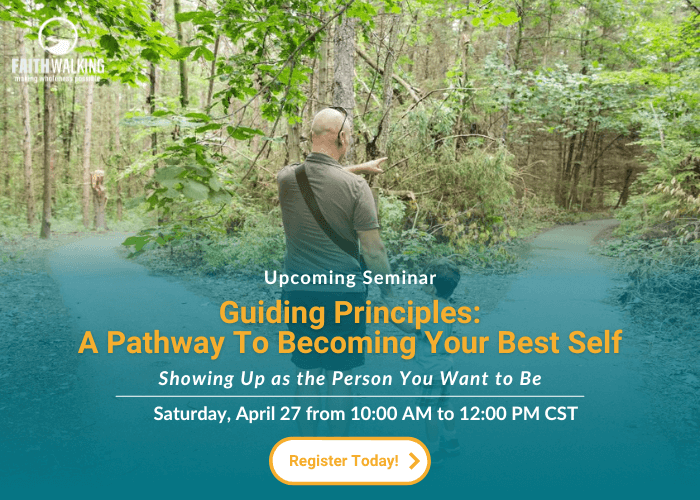Changing the Conversation: Restoring Compassion, Courage, and Connection
How do we keep the conversation going?
To keep an alternative conversation alive, I think you need to find the harmony between two movements. The first movement is one of refreshment and centering – creating space in your life to practice some form of contemplative expression (silence, meditation, solitude, centering prayer…) in order to detach from life lived out of your head, captive to the tyranny of your own unchecked ideas about the past or the future. Henri Nouwen puts it this way: “The real enemies of our life are the “oughts” and the “ifs.” They pull us backward into the unalterable past and forward into the unpredictable future. But real life takes place in the here and the now. God is a God of the present. God is always in the moment, be that moment hard or easy, joyful or painful.”
In this movement you also need to create space to be reminded of who you want to be – of who you were created to be. In the Faithwalking world, we speak of remembering and clarifying the guiding principles and positive declarations that we have identified, with God’s help, as we have paid attention to the revelation of God’s Spirit in our life.
Finally, this movement also requires you to incorporate as much self care as soul care in your life. The things that bring joy to your soul must be integrated with healthy rhythms of rest, nourishment, nature, and exercise. This may seem like a lot, but you will find that it is life giving and sustaining. In this movement of refreshment and centering, mind, soul, and body must be aligned.
The second movement is that of intentional courage – the courage to choose to move toward an anxiety-producing conversation instead of away from it or against it. Left to your own strength, you will probably choose to avoid or dominate the conversation, thus contributing to the kind of conversation that is taking place around us. The alternative conversation we are hoping to cultivate requires a courageous and centered you who is able to show up, to listen, to ask questions, and to say what is so for you with love. It is a conversation that is able to hold the tension of disagreement for the sake of love and connection – one in which you do not seek to be right, but to be connected; not to look good but to love well; not to win an argument, but to learn and to understand. It is a conversation in which you do not seek to be perfect, but to have integrity with your truest and best self.
The apostle Peter reminds us that God “…has given us everything we need for a godly life…” (2 Peter 1:3 NIV). You are not alone or lacking in this courageous effort; rather, it’s about learning and practicing qualities that you have already been given: “For this very reason, make every effort to add to your faith goodness; and to goodness, knowledge; and to knowledge, self-control; and to self-control, perseverance; and to perseverance, godliness; and to godliness, mutual affection; and to mutual affection, love” (2 Peter 1:5-7 NIV). Ultimately, love is what truly sustains this courage.
Let me conclude with an analogy I remember from my early days of Faithwalking that is helpful when considering these two movements as we seek to advance an alternative conversation. It’s an analogy about your feet and your ability to walk. When walking, your right foot is as important as your left foot. Walking is not about proving that one foot is better or more important than the other – it is about moving forward. In order to walk, you need both feet. There are times when your left foot is holding most of the weight of your body, just as there are times when the weight is on your right foot. What is important is the balance you need for both feet to hold you at any given time. Have you ever tried to get somewhere by hopping on one foot? You may get there eventually, but it will require a great deal of effort and time. Walking is better – your body was designed to move forward on both feet. So it is with these two movements.
Remember also that you didn’t know how to walk when you were born: walking is a learned skill that requires far more practice than explanation. In the same way, as you discover that you want to move forward with an alternative conversation in your life and in your community, we encourage you to practice, to persevere, and to trust that even when you fall, you have the capacity to get back up, clean up any mess your fall created, and keep going.
“Keep Going” by Edgar A. Guest (excerpt)
When things go wrong, as they sometimes will,
When the road you’re trudging seems all up hill,
When the funds are low and the debts are high,
And you want to smile, but you have to sigh,
When care is pressing you down a bit,
Rest if you must—but don’t you quit.
Written by Marcos Leon
____________
Please consider supporting Faithwalking through:

Giving. Help us reach our financial goal this year. We are praying and hoping for:
$35,000 by the end of 2020 in one-time gifts, plus:
– 60 monthly donors of $15 per month
– 40 monthly donors of $25 per month
– 20 monthly donors of $55 per month
Pledge or contact us to arrange your giving

Praying. Help us by committing to pray for us weekly.
We need discernment, wisdom, and provision of human and financial resources to make Faithwalking possible and accessible. Join our intercessor team.

Promoting. Help us promote the work of Faithwalking: like and share our posts, and post about our work.
There are several ways people can learn about Faithwalking at no cost. Help us promote:
The Faithwalking Facebook page
Please also help us promote our
Faithwalking Foundations modules and Ongoing Education Offerings
Why Faithwalking?
We believe that God’s intended design is for wholeness in individuals, communities, and the world. We believe that God’s hope is for shalom to be present, which includes peace, unity, completeness, wholeness, and well-being for everyone and in everyone. God’s hope is for the Kingdom to come on earth as it is in heaven.
We live in a world of brokenness: People are chronically anxious and reactive, internally conflicted, frequently unloving, and regularly unconcerned about the common good. Many Christians are inconsistent in following the way of Jesus.
Our Mission
To make wholeness possible for individuals, communities, and the world.
We do this through a process of spiritual formation where people are equipped with tools to gain freedom from wounds of their past, grow in emotional maturity, and live lives of purpose on mission with God, so that they increasingly follow the way of Jesus by serving the poor, the marginalized, and those in need, working for the common good, and restoring individuals, social systems, communities, and nations to God’s intended design.
Our Vision
Our vision is for Faithwalking to be accessible to every person in the world so that participants become agents of wholeness in their own context.



